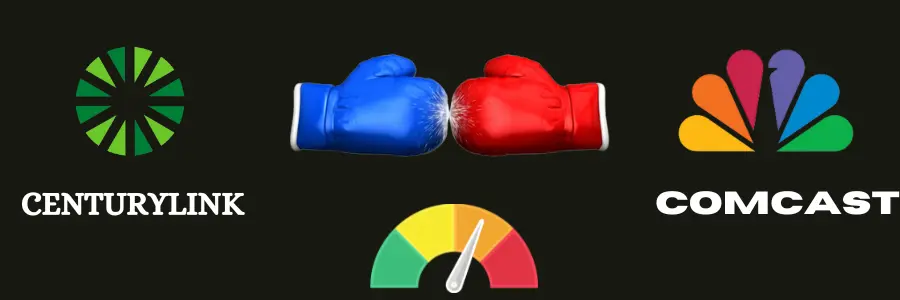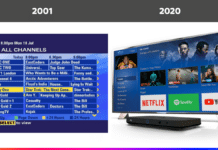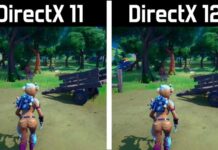
The internet has become an integral part of our daily lives, connecting us with the world and providing us with essential services. When it comes to choosing an internet service provider, it’s important to consider factors such as speed, reliability, and customer service. In this article, we’ll take a close look at two of the most popular internet service providers in the US, CenturyLink, and Comcast. By comparing their plans, pricing, and other features, we aim to provide you with a comprehensive guide to help you make an informed decision about which provider is the best fit for your needs. Whether you’re a heavy gamer, a remote worker, or a casual web surfer, we’ve got you covered. So, let’s dive in and explore the differences between CenturyLink and Comcast’s internet services.
Speed Comparison
Internet speed is one of the most important factors when choosing an internet service provider. In this section, we will compare the internet speeds offered by CenturyLink and Comcast and discuss how they impact your internet experience.
CenturyLink offers a range of internet speeds, from 15 Mbps to 940 Mbps, depending on the location. On the other hand, Comcast offers internet speeds ranging from 25 Mbps to 1,200 Mbps, depending on the plan and location.
When it comes to internet speeds, it’s important to understand what they mean and how they affect your online experience. Download speed refers to the rate at which data is transferred from the Internet to your device, while upload speed refers to the rate at which data is transferred from your device to the Internet.
For example, if you’re streaming a movie, you need a fast download speed to avoid buffering and ensure a smooth streaming experience. Similarly, if you’re uploading large files, such as photos or videos, to the cloud, you need a fast upload speed to make the process quick and efficient.
In general, CenturyLink offers lower internet speeds compared to Comcast. However, for basic internet usage such as browsing the web, sending emails, and streaming music, CenturyLink’s lower speeds may be sufficient. If you need faster speeds for online gaming, streaming video content in high-definition, or uploading large files, Comcast’s higher speeds may be more suitable for your needs.
In conclusion, when comparing CenturyLink and Comcast internet speeds, it’s important to consider your internet usage needs and choose the provider that offers the speeds that will work best for you.
Plan Differences
When it comes to internet plans, CenturyLink and Comcast offer a variety of options to fit different needs and budgets. In this section, we will compare the different internet plans offered by these two providers and discuss their pricing structures, features, and additional fees.
CenturyLink Internet Plans
- CenturyLink Fiber Internet: This plan offers speeds up to 940 Mbps, making it ideal for households with multiple devices and high bandwidth needs. The plan starts at $65 per month and comes with a Price for Life guarantee, which means your price won’t change as long as you keep the same plan.
- CenturyLink DSL Internet: This plan is available in areas where fiber is not yet available and offers speeds up to 140 Mbps. Plans start at $49 per month and come with a Price for Life guarantee.
- CenturyLink High-Speed Internet: This plan offers speeds up to 80 Mbps and is a good option for households with fewer devices and lower bandwidth needs. Plans start at $49 per month and come with a Price for Life guarantee.
Comcast Xfinity Internet Plans
Comcast Xfinity also offers a range of internet plans to fit different needs, with faster speeds and more features as you move up the pricing tiers. Here are some of the internet plans offered by Comcast Xfinity:
- Xfinity Gigabit Internet: This plan offers speeds up to 1 Gbps and is ideal for households with multiple devices and high bandwidth needs. Plans start at $70 per month and come with a two-year contract.
- Xfinity Performance Internet: This plan offers speeds up to 200 Mbps and is a good option for households with fewer devices and lower bandwidth needs. Plans start at $55 per month and come with a one-year contract.
- Xfinity Performance Starter Internet: This plan offers speeds up to 25 Mbps and is a basic option for households with very light internet usage. Plans start at $30 per month and come with a one-year contract.
In addition to the monthly plan fees, both CenturyLink and Comcast Xfinity may charge additional fees and charges, including installation fees, equipment fees, early termination fees, and more. It’s important to read the fine print and understand all of the fees associated with each plan before signing up.
Reliability and Customer Service
When it comes to choosing an internet service provider, reliability is key. In this section, we will compare the reliability of CenturyLink and Comcast Internet and evaluate their customer service ratings.
Reliability
Reliability is the ability of an internet service provider to consistently provide an uninterrupted and stable internet connection. CenturyLink and Comcast both claim to offer reliable internet service, but how do they actually stack up?
According to the Federal Communications Commission’s (FCC) 2021 Fixed Broadband Report, Comcast’s average download speeds were consistently higher than CenturyLink’s in every region of the United States. However, when it came to reliability, CenturyLink fared better than Comcast, with fewer service interruptions and outages reported.
Another important factor to consider when it comes to reliability is latency. Latency is the delay between when data is sent and received and is measured in milliseconds. Lower latency means a smoother and more responsive internet experience, particularly for online gaming and video conferencing. In this regard, Comcast has a slight advantage, with lower average latency reported in the FCC’s 2021 report.
Customer Service
Customer service is another important consideration when choosing an internet service provider. Issues with internet service can arise at any time, and having responsive and helpful customer support can make all the difference.
According to the American Customer Satisfaction Index (ACSI), CenturyLink has consistently received lower customer satisfaction scores than Comcast. However, both providers have received poor ratings in recent years, indicating that there is room for improvement in the customer service department.
It is also worth noting that customer service experiences can vary widely depending on location and individual circumstances. It may be helpful to read reviews and ask for recommendations from others in your area before making a decision.
Overall, while CenturyLink may have a slight advantage in reliability, Comcast has consistently received higher customer satisfaction scores. It is important to weigh these factors and consider your individual needs when choosing between these two providers.
Value for Money
Internet service providers often compete on pricing to attract customers, but the cheapest option may not always be the best value. In this section, we’ll compare CenturyLink and Comcast Internet based on overall value for money.
- Pricing Structure:
The first thing to consider when comparing the value of internet service providers is their pricing structure. Both CenturyLink and Comcast offer a variety of plans at different price points, and the value of each plan will depend on your individual needs and budget.
- Additional Features and Benefits:
While pricing is an important factor in determining the value of an internet service provider, it’s not the only factor to consider. CenturyLink and Comcast offer additional features and benefits that can impact the overall value of their service.
For example, both providers offer Wi-Fi routers with their service, but the quality and speed of the router may vary. Additionally, CenturyLink offers a Price for Life guarantee, which means that the price of your internet plan will never go up as long as you remain a customer.
- Data Caps:
Data caps can impact the overall value of an internet service provider, as they can lead to additional charges if you exceed your monthly data allowance. While Comcast has a 1.2 TB data cap on most of its plans, CenturyLink does not have a data cap on any of its plans.
- Contract Terms:
Another factor to consider when comparing the value of CenturyLink and Comcast Internet is their contract terms. CenturyLink offers a variety of contract options, including no-contract plans, while Comcast requires a minimum one-year contract for most of its plans. This can impact the overall value of each provider depending on your individual needs and circumstances.
- Customer Satisfaction:
Finally, customer satisfaction is an important factor to consider when comparing the value of internet service providers. CenturyLink and Comcast both have mixed customer service ratings, but CenturyLink has a slightly higher rating overall according to the American Customer Satisfaction Index (ACSI).
In conclusion, when comparing the overall value for money of CenturyLink and Comcast Internet, it’s important to consider factors beyond just pricing. Additional features and benefits, data caps, contract terms, and customer satisfaction all play a role in determining the value of each provider.
Availability and Installation
When choosing an internet service provider, one of the most important factors to consider is availability. CenturyLink and Comcast are both major providers, but their service areas can vary. Here’s what you need to know about availability and installation for each provider.
Availability
CenturyLink and Comcast both offer services in many areas of the United States, but the availability of each provider can vary depending on your location. Before making a decision, it’s important to check if the providers are available in your area. You can do this by visiting the CenturyLink and Comcast websites and entering your zip code or address to see if the service is available.
Installation
Once you’ve determined that CenturyLink or Comcast is available in your area, the next step is to schedule an installation. Installation times and requirements can vary depending on the provider and the type of service you’re signing up for.
CenturyLink offers self-installation options for some plans, which can be a convenient option for those who are comfortable setting up their own equipment. If you choose professional installation, a technician will typically visit your home to install and set up your internet equipment. Installation times can vary but are generally scheduled within a few days to a week of signing up for service.
Comcast also offers self-installation options for some plans and professional installation for others. Comcast’s Xfinity installation is typically done by a technician, and installation times can vary based on demand in your area. Customers can check the status of their installation appointment online or through the Xfinity app.
Overall, the availability and installation process for CenturyLink and Comcast can vary depending on your location and the type of service you’re signing up for. Be sure to check availability and compare installation options before making a decision.
Contract Terms and Promotions
When choosing an internet service provider, it’s important to understand the contract terms and promotions they offer. In this section, we’ll compare the contract terms of CenturyLink and Comcast Internet, as well as the promotional offers and discounts available to new customers.
Contract Terms
CenturyLink offers a variety of contract options, including no-contract plans and two-year plans. No-contract plans are great for those who don’t want to be tied down to a long-term agreement but typically come with higher monthly fees. Two-year plans are typically less expensive on a monthly basis but require a commitment to the service for a longer period of time.
Comcast Internet also offers no-contract and two-year plans. In addition, they offer a one-year agreement option that falls between the two in terms of commitment length and monthly pricing.
Both providers have early termination fees associated with their contract plans. CenturyLink’s fees vary based on the length of the contract and how far into the contract the termination occurs. Comcast’s early termination fee is a flat rate and can be up to $230, depending on the plan.
Promotions
CenturyLink and Comcast both offer promotional deals to new customers. These deals can include discounted monthly rates, waived installation fees, and free equipment rentals. It’s important to note that promotional rates typically expire after a certain period of time, so it’s important to read the fine print before signing up.
CenturyLink’s promotional deals vary depending on the region and availability but can include discounts on internet plans, waived installation fees, and a free modem or router rental.
Comcast’s promotions also vary by region but may include discounted monthly rates, free equipment rentals, and a Visa gift card as a sign-up bonus.
It’s important to do your research and compare the contract terms and promotions of both providers to determine which option is the best fit for you.
Equipment Quality and Data Caps
When choosing an internet service provider, it’s important to consider the quality of the equipment they provide and whether or not they have data caps. In this section, we’ll compare the equipment quality and data caps of CenturyLink and Comcast.
Equipment Quality
CenturyLink and Comcast both offer various types of equipment, such as modems and routers, to their customers. The quality of the equipment can impact the speed and reliability of your internet connection, so it’s important to choose a provider that offers high-quality equipment.
CenturyLink offers various modem and router options for their customers, including some models that support Wi-Fi 6. They also offer a rental program where customers can rent equipment for a monthly fee, or purchase their own equipment to use with their service. Comcast, on the other hand, offers the xFi Gateway modem and router combo for their customers, which supports Wi-Fi 6 and comes with advanced security features.
Data Caps
Data caps refer to the limit on how much data you can use in a given month before you start incurring additional fees or having your speed reduced. CenturyLink and Comcast have different data cap policies.
CenturyLink does not have any data caps on its internet plans, which means you can use as much data as you want without worrying about additional fees or reduced speeds.
Comcast, however, does have data caps on its plans. The specific data cap varies depending on the plan, but the majority of plans have a 1.2TB monthly data cap. If you exceed this limit, you will be charged an additional fee or have your speed reduced.
In conclusion, when considering equipment quality and data caps, CenturyLink offers better equipment options and no data caps on their plans, while Comcast provides a modem and router combo with advanced security features and has data caps on their plans. Depending on your needs and priorities, either provider may be a better fit for you.
Bundles and Additional Services
In addition to internet services, CenturyLink and Comcast offer bundles and additional services to their customers. This section will compare the bundle options and additional services provided by both providers.
Bundles
Bundles are packages that combine two or more services, such as internet, TV, and phone, for a discounted price. CenturyLink and Comcast both offer bundle options to their customers.
CenturyLink offers the “Price for Life” bundle that includes internet, home phone, and Prism TV services for a fixed price that doesn’t change over time. Customers can choose from different internet speeds and TV packages based on their preferences.
Comcast offers the Xfinity Triple Play bundle that includes internet, TV, and phone services. Customers can choose from different internet speeds and TV packages based on their preferences. They also offer the Xfinity Double Play bundle that includes internet and TV services.
Additional Services
Both CenturyLink and Comcast offer additional services beyond the internet, TV, and phone.
CenturyLink offers home security and automation services through its partnership with SimpliSafe. Customers can choose from different packages that include various home security features such as cameras, motion detectors, and door sensors.
Comcast offers home security and automation services through its Xfinity Home package. Customers can choose from different packages that include various home security features such as cameras, motion detectors, and door sensors. They also offer Xfinity Mobile, which is a wireless service that uses Verizon’s network and offers unlimited data plans.
When it comes to bundles and additional services, CenturyLink and Comcast offer similar options. Customers can choose from different bundle packages that combine internet, TV, and phone services at a discounted price. Both providers also offer home security and automation services. Ultimately, the choice of which provider to choose will depend on your specific needs and preferences.
In Crux
In conclusion, choosing the right internet service provider can be a daunting task, but it’s important to consider factors such as internet speed, plan differences, reliability, customer service, value for money, availability, contract terms, equipment quality, and bundle options before making a decision.
After thorough research and comparison, it is clear that both CenturyLink and Comcast have their own strengths and weaknesses. CenturyLink may be a better fit for those who prioritize speed and affordability, while Comcast may be a better option for those who value reliability and additional features such as TV and home security services.
When choosing between the two, it’s essential to consider your specific needs and preferences. Are you a heavy internet user who needs high-speed internet for work or streaming? Are you looking for a provider with reliable customer service? Do you need additional services such as TV or phone?
Taking these factors into account, you can make an informed decision on which provider is the best fit for you. We hope this article has provided valuable insights and advice on how to choose the right internet service provider for your needs.
[WPSM_AC id=965]























